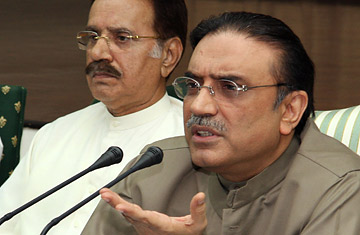
Co-chairman of the ruling Pakistan People's Party Asif Ali Zardari.
Ten days before he stands for election as Pakistan's next president, Asif Ali Zardari is coming face to face with his controversial past. It offers both comfort and concern.
On Tuesday the last of the many corruption charges levelled against Benazir Bhutto's widower were dropped by a Swiss court. But as the news broke, questions were being raised about the co-chairman of the Pakistan People's Party's mental health. The Financial Times reported that Zardari was diagnosed as suffering a range of mental illnesses as recently as last year. Citing court documents filed by his doctors, the London-based newspaper said Zardari had developed conditions including severe depression, dementia and post-traumatic stress disorder during the more than 11 years he spent in prison under corruption charges. He also suffered from thoughts of suicide, a doctor wrote to the court.
Bhutto's two terms as prime minister collapsed abruptly amid charges of corruption. On both occasions, Zardari was arrested and thrown behind bars. Charges in Pakistan were dropped earlier this year after courts ratified an amnesty issued by former President Pervez Musharraf, who stepped down last week. The longest-running case abroad involved money-laundering charges in Switzerland, filed in 1997. Zardari and Bhutto were prosecuted before appealing the decision. Swiss judicial authorities announced on Tuesday that the case was now closed. The Pakistan government had withdrawn its sponsorship of the charges, Geneva's chief prosecutor said, resulting in the release of $60 million held in frozen bank accounts belonging to the couple.
Zardari and his political supporters have long claimed that he was beaten and tortured during those years. "He suffered a great deal," says Wajid Shamsul Hasan, a family friend and Pakistan's High Commissioner to the UK. "He was held under terrible conditions, his tongue was cut and [he was] even physically attacked." Upon his release, Zardari travelled to New York to receive medical attention.
According to the Financial Times, the medical documents it reviewed were prepared "to argue successfully for the postponement of a now-defunct English High Court case in which Pakistan's government was suing Zardari over alleged corruption." The report, which was mentioned by a handful of television news channels but ignored by broad sections of the Pakistani media, carries two serious implications: either the reports were not accurate or Zardari could still be suffering from these conditions and may not be a suitable candidate for president.
Members of Zardari's Pakistan People's Party have rejected the report and say while Zardari continues to suffer from "high-blood pressure and diabetes," he is in "good mental and physical health." "The report has been quoted out of context," says Hussain Haroon, a friend of Zardari and Pakistan's incoming ambassador to the United Nations. "[It] refers to something three years old. He is fit and well. He was jogging around the Prime Minister's House just a moment ago." There is also a suspicion among the PPP that the court documents were leaked to frustrate Zardari's presidential ambitions. "This feels like a deliberate attempt to damage him," says Fauzia Wahab, a PPP legislator.
In any case, his political opponents have not seized on the issue. Observers imagine that they may still try. "I don't know if someone's going to raise it or not, but being of sound mind is a condition of becoming president," says Shafqat Mahmood, a political analyst and newspaper columnist. "His opponents may bring it up to attack Mr. Zardari, and submit a petition to the Election Commission."
However, it is unlikely that any such effort will be successful. The private lives of politicians are scarcely intruded upon in Pakistan, partly owing to cultural sensitivities. And there is no obligation to disclose a medical condition. "I don't think that the Election Commission will accept any such petition," adds Mahmood. "It may just become a short-term sensation. It's a different case here, compared to in the West. Part of the reason is that so many incredible stories appear in our political discourse, that a certain skepticism has set in. People will be reluctant to believe it."
